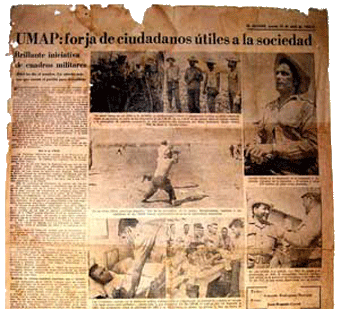Dictatorships, according to the analysts, mutate to make threats disappear when their totalitarian power is threatened; to manage it, they are capable of acting against themselves. Nothing is worth more than the Government and its remaining in power as omnipotent beings.
Hitler, for all his ravings, lacked foresight into the future, which was overshadowed by his unbridled ambition; given the historic circumstances he didn’t have the opportunity to manipulate his environment. I always wonder if in order to save his position as Chancellor of the Third Reich he would have been capable of giving space in the media to the Jews themselves, whom he persecuted with intentions of exterminating them.
Instead, this is what we have seen in over half a century of Cuban dictatorship. To those who persecuted as the worst example of a sick society: homosexuals were expelled from their workplaces, universities, locked in concentration camps: Military Units to Aid Production (UMAP), removed from their jobs in theaters, publishing, television, university — at that famous stage of the “parameterization*” — and they then relocated them as punishment for their sexual orientation in places where they were not visible.
The story of the writer Antón Arrufat is famous, today a winner of the National Literature Prize, they put him to sorting books in the Enrique José Varona library in Marianao, directed by Silvia Gil, the wife of Ambrosio Fornet, another National Literature Prize winner, which belongs to the headquarters of the Casa de las Americas.
The truth is that when this intellectual, vilified and humiliated for his sexual orientation and his rebellious play “Seven Against Thebes,” poked his head in simply for having recognized the voice of some friend or writer, this woman, in the best fascist style, corrected it with a breath of air and an intolerant gesture, to make him once again look inward. Under the punishment regime, the writer waited for years in total silence.
Lezama, Piñera and Reinaldo Arenas also suffered. And the vast majority of young people who now have gray hair, raised up by the dictatorship, accept jobs other than cultural and political, and become complicit in many injustices. Meanwhile, in the everyday reality of power, they are treated contemptuously as “faggots,” and make fun of their cowardice and gestures as if they were buffoons.
Everyone who wasn’t married, who didn’t wear boots, smoke cigars, was suspected of being weak, especially if he was an artist. So the 2007 “Little Email War” is understandable, when Papito Serguera and Luis Pavón, puppets of the repressive era of the ’60s and ’70s, who only followed orders, tucked in their tails in the media: they were generally rejected by the Cuban arts world, very-well managed by the then Minister of Culture Abel Prieto, a manipulation that over time won him the job of Presidential Advisor that he enjoys today. In those days, whoever managed those threads silenced the worried intellectuals.
You have to wonder if the Jews had accepted being manipulated by Hitler to salvage his stay in power, as the vast majority of those “parameterized*” and censored the “Five Gray Years*” have done, pretending to be happy and then later being allowed to launch their timid rants behind closed doors, first in the Casa de las Americas, then the Instituto Superior de Arte (ISA), where they bled out their anger.
Today they buy their silence. They shouldn’t ignore that they will continue to be despised. I know that many know they are despised, considered expendable pieces in a game that only those who brought it are allowed to move. They know that the State’s elite are still the same chauvinists whom the creators see as “the soft part of society, and a dangerous enemy of power.” They’re right about the second part.
Ángel Santiesteban-Prats
Lawton Prison Settlement, October 2013
*Translator’s note: At that time, a process known as “parametración” imposed strict guidelines on cultural workers and educators and subjected their sexual preferences, religious beliefs, connections with people abroad and other aspects of their personal life to intrusive scrutiny.
Translated by RST
1 November 2013

